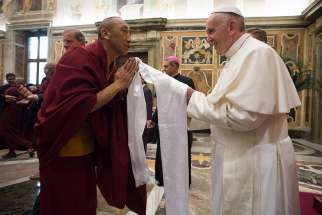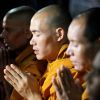VATICAN CITY – Catholics and Buddhists must strengthen efforts to reject violence in all of its forms as well as to urge and educate people in a life of nonviolence, said Cardinal Jean-Louis Tauran, president of the Pontifical Council for Interreligious Dialogue.
Benedictine Father William Skudlarek finds dialogue with Buddhists, Muslims help his prayer life
ROME (CNS) -- Benedictine Father William Skudlarek said Buddhists have helped him learn to listen more when he prays, and Muslims have helped him show deeper reverence in prayer.
Skudlarek, a member of St. John's Abbey in Collegeville, Minn., is secretary-general of the international Monastic Interreligious Dialogue, a project of Benedictine and Trappist monks and nuns that promotes dialogue with Buddhists, Hindus and Muslims in some version of monastic life.
He was in Rome Sept. 17-25 to lead a workshop for members of the Congress of Abbots of the Benedictine Confederation of Monastic Communities.
The monastic dialogue began in the 1970s, and Skudlarek began participating in the mid-1990s.
The Benedictine said his contact with Buddhists has led him, twice a day, to sit in silence like Buddhists do when they meditate.
"I don't know if I can exactly describe what I've gotten from that, but I sense I've gotten something," Skudlarek said.
"I think I've come to a much deeper understanding of prayer as simply pure receptivity," he said. "I'm not there to tell God anything that God doesn't already know. I'm simply there and I'm simply present."
Skudlarek said he was also impressed by the committed celibacy of Buddhist monks, who don't have the motivation of following Jesus' example of total dedication to ministry.
In his more limited contact with Muslims, he has been struck by their dedication to praying five times a day.
Muslim prayer can seem very "formalistic" in its gestures and words, the Benedictine said, but he has come to recognize it as "a deeply spiritual path. It comes out of a sense of wanting to be totally faithful to God."
Muslims at prayer express "an almost palpable reverence, an incredible reverence," he said. "I look on my own prayer, and so much Christian prayer, and it seems sloppy by comparison. It just seems like it's too informal."
Exposure to Muslim prayer has increased his appreciation of the formal, communal prayers that mark his life as a Catholic monk, he said, teaching him to see them "not just as legalistic formalities, but as a way of heightening one's sense of what one is doing."
On the other hand, Skudlarek said, the Christian belief that God became human in Jesus Christ gives Christian prayer a "familial sense" that Islam, with its emphasis on the utter transcendence of God, does not have.
Although the monks and nuns engaged in the dialogue do discuss questions of theology, their focus is on "spiritual experience and spiritual practice," he said.
Catholic monks and nuns find common ground with Buddhists, and with Muslims practicing Sufism, or Islamic mysticism, in a regulated religious life devoted largely to contemplation, he said.
Monasticism is "a search for God, ultimately," and Catholic monks and nuns "are interested in how others search for what they would refer to as ultimate value or ultimate meaning," he said.
"This makes it sound very deep, very serious, but my experience of dialogue is what really happens, in the first place, is that we become friends with each other" and recognize that "all of us have more questions than answers," he said. "All of us are still searching."
In many ways, "it is not that we are on different paths all going up the mountain and going toward the same goal," Skudlarek said. "We are on the same path going in different directions ... we're ending up in different places."
"The way a Buddhist describes 'nirvana' is quite different from the way a Christian -- and maybe a Muslim and a Jew -- would describe heaven or paradise," he said.
"Don't ask me to explain that," Skudlarek said, "that's the theologians' work."
GARRISON, N.Y. - Combating greed in contemporary society requires a personal commitment to overcome an ancient moral evil, according to speakers at a Buddhist-Christian dialogue May 5 at the Graymoor Spiritual Life Center in Garrison.
"A Buddhist & Christian Understanding of Greed: Personal and Structural" was the topic for the ninth annual dialogue between the two religions sponsored by the Franciscan Friars of the Atonement.
Presenters said both Christian and Buddhist scriptures decry greed, but prescribe different solutions.




